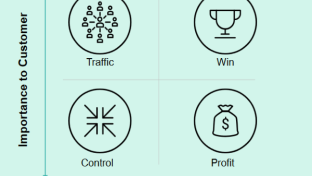Americans’ Confidence in Grocery Stores, Gov’t Hits New Low
According to the eighth wave of the dunnhumby Consumer Pulse Survey, part of an 18-month worldwide study of the effect of COVID-19 on customer attitudes and behavior in 24 countries, 64% of U.S. consumers said that grocery stores aren’t doing a good job with COVID-19, compared with February 2021 when 50% of respondents said that grocers were doing a good job. Further, 83% said that the government isn’t doing a good job, either, in the latest wave of the study, marking the lowest point of confidence in the government’s handling of the crisis.
Consumers’ concerns with grocery stores include the sense that things aren’t returning to normal (76%), the presence of unvaccinated shoppers in stores (34%) and fears about the virus itself (26%). While 21% said there was no store that provides good value for the money, Walmart continued to be the top pick for providing the best value (29%), followed by Aldi (12%), Kroger (7%) and Target (6%). Amazon dropped out of the top five stores for value, chosen by just 4% of respondents.
“After living with the pandemic for 20 months, consumers are now twice as concerned about their personal finances as they are about COVID itself,” said Grant Steadman, president for North America at Chicago-based dunnhumby. “With inflation persisting, and government stimuluses phased out, the majority of shoppers are now looking for greater value. Retailers who are perceived as offering more value, and respond to their customers’ increasing need for this, will earn the loyalty of the new customers they gained during the early phases of the pandemic.”
Among the key findings of the study:
- Shopping trips and restaurant visits are returning to pre-pandemic behavior. Over the course of the 18-month study, consumers have changed how often they shopped from a low of only 3.8 trips a week in March 2020, to 5.6 trips a week in July 2020, to six trips a week in September 2021. Similarly, during the same period, visits to restaurants for carryout, delivery or eat-in have ranged from a March 2020 low of 62% of consumers, to 78% in July 2020 and now 82% in September 2021, the highest amount since the start of the study. The number of consumers eating in a restaurant has also grown from just 10% in March 2020 to 49% in September 2021, also the highest point in the study.
- Although consumers’ opinion of the economy has improved, 55% still believe that the economy is weak, and 40% say that their personal finances are also weak. Over the eight waves of the study, consumers’ perception of the state of the economy has improved by 20 percentage points versus just a five-point improvement in how they feel about their own personal finances.
- Levels of concern about COVID-19 in the United States have continued to drop and are at their lowest level (17%), a 14-point decline since March 2020. The United States is in the lower half of countries surveyed on the dunnhumby Worry Index.
- Value-seeking consumers (66%) continue to outnumber quality-seeking consumers (19%), although value seekers’ numbers have dipped slightly (five points) since the last wave. The two most common behaviors are shopping at stores with the lowest prices (55%) and shopping at stores with the best quality (44%). Next are stocking up when things go on sale (36%) and paying more for quality (30%).
- The number of people who shop both store and online has grown to 47% since the start of the pandemic, when it was at 35%. The United States is in the middle of countries in its number of omnichannel shoppers, and satisfaction with online shopping in the United States is now the same as that for in-store shopping, at 32%.
- Cash remains the dominant payment method (49%), followed by traditional credit cards (46%) and debit cards (41%), with mobile apps far behind (13%).
- Only 14% of U.S. survey respondents are concerned about data privacy.
For the study, dunnhumby surveyed 58,089 respondents online in 24 countries: Asia (Australia, China, Japan, Malaysia, Thailand); Europe (Czechia, Denmark, France, Germany, Hungary, Ireland, Italy, Norway, Portugal, Slovakia, Spain, United Kingdom); Latin America (Brazil, Chile, Colombia); and North America (United States, Canada, Mexico). The online interviews were conducted for Wave One from March 29-April 1 2020; Wave Two from April 11-14, 2020; Wave Three from May 27-31, 2020; Wave Four from July 9-12, 2020 in the United States, Canada and Mexico only; Wave Five from Aug. 28-Sept. 3, 2020; Wave Six from Nov. 20-25, 2020; Wave Seven from Feb. 18-24, 2021; and Wave Eight from Aug. 27-Sept. 3, 2021. About 400 individuals were interviewed in each country for each wave of the study, and respondents were roughly 60% female and 40% male.
The dunnhumby Customer Data Science Platform offers a unique mix of technology, software and consulting, with the aim of enabling businesses to increase revenue and profits by delivering exceptional experiences for their customers in-store, offline and online. dunnhumby employs almost 2,500 experts in offices across Europe, Asia, Africa, and the Americas, working for such brands as Tesco, Coca-Cola, Meijer, Procter & Gamble, and Metro.
Bentonville, Ark.-based Walmart operates more than 10,500 stores under 48 banners in 24 countries, and e-commerce websites, employing 2.2 million-plus associates worldwide. Walmart U.S. is No. 1 on The PG 100, Progressive Grocer’s 2021 list of the top food and consumables retailers in North America. Seattle-based Amazon is No. 2 on the list, while its wholly owned subsidiary, Austin, Texas-based Whole Foods is No. 26. Meanwhile, Cincinnati-based Kroger is No. 3, Minneapolis-based Target is No. 6 and Batavia, Ill.-based Aldi U.S. is No. 24 on PG’s list.







